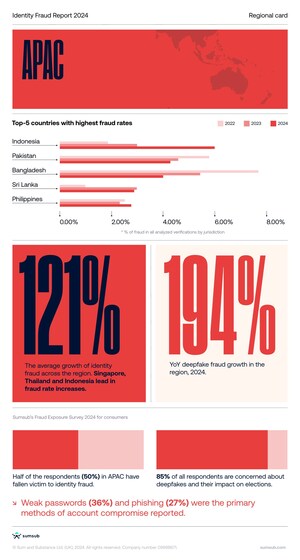2024 is heralded as 'The Year of Democracy,' with numerous countries globally set to hold their elections this year. This environment creates fertile ground for fraudsters and malicious actors to spread disinformation, facilitated by the widespread availability of artificial intelligence (AI) tools.
There have been instances of AI misuse in political contexts in the recent year. In Singapore, deepfake videos impersonating the previous Prime Minister Lee Hsien Loong, fuelling cryptocurrency scams, garnered attention last December. Similarly, during the Indonesia presidential elections earlier this year, an AI-generated likeness of former president Suharto prompted discussions on the dangers of AI technology.
"As we witness the escalating prevalence of deepfakes, it becomes increasingly clear that these challenges extend beyond business realms. They reflect the broader landscape of the wider digital world, where fighting misinformation, the spread of AI-generated scams, and online fraud is imperative to safeguarding society," said Vyacheslav Zholudev, Co-founder and CTO of Sumsub.
Other findings from Sumsub include:
- In Q1 2024, China was the country with the highest absolute amount of deepfake instances detected globally.
- Across the APAC region in Q1 2024, identity document forgery emerged as the most prevalent fraud type, ranging from 25% of all fraud cases in Singapore to 45% in Indonesia.
- Identity fraud rates in the fintech sector increased 216% YoY in Hong Kong, 142% in Singapore, 138% in Thailand and 108% in Malaysia.
- In crypto, the fraud rate grew YoY 160% in Indonesia (reaching record 7.23% of all verifications), 71% in Singapore and 106% in Thailand.
"The number and quality of deepfakes is increasing and evolving daily worldwide. Even with the most progressive technology, it's getting much harder to differentiate between a deepfake and reality. The only way forward is to fight AI with AI. For businesses, the ultimate tool that keeps them protected is a multi-layered anti-fraud solution with different checks at various user journey stages. But content platforms and common users remain vulnerable to deepfakes, especially in light of 2024 elections. Media platforms must stay vigilant, remaining aware and updating defenses to detect deepfakes and prevent AI-generated fraud. They need to make sure they are not inadvertently contributing to the spread of misinformation," said Pavel Goldman-Kalaydin, Head of AI/ML at Sumsub.
To stay informed on the most up-to-date deepfakes and identity fraud trends as well as corporate news and product updates, please follow Sumsub's Newsroom. To download the company's whitepapers for free, please visit https://sumsub.com/guides-reports/
* Note on the source
The content of this press release is based on detailed statistics and analysis of millions of verification checks performed by the Sumsub platform from Q1 2023 to Q1 2024, accurately highlighting current fraud incidence rates. This includes analysis of thousands of detected deepfake cases. All internal data was aggregated and anonymized for the purpose of publishing these findings.
** Please note that Ukraine's 2024 elections are suspended due to martial law restrictions (at the moment of publication).
About Sumsub
Sumsub is a full-cycle verification platform that secures the whole user journey. With Sumsub's customizable KYC, KYB, Transaction Monitoring and Fraud Prevention solutions, you can orchestrate your verification process, welcome more customers worldwide, meet compliance requirements, reduce costs, and protect your business.
Sumsub has over 2,000 clients across the fintech, crypto, transportation, trading, e-commerce and gaming industries including Bitpanda, Wirex, Avis, Bybit, Huobi, Kaizen Gaming, and TransferGo.
SOURCE Sumsub






Share this article